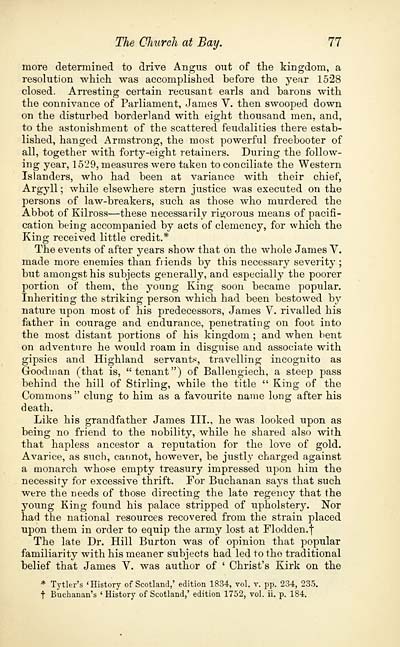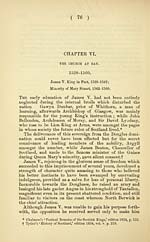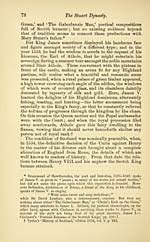Stuart dynasty
(97) Page 77
Download files
Complete book:
Individual page:
Thumbnail gallery: Grid view | List view

The Church at Bay. 77
more determined to drive Angus out of the kingdom, a
resolution which was accomplished before the year 1528
closed. Arresting certain recusant earls and barons with
the connivance of Parliament, James V. then swooped down
on the disturbed borderland with eight thousand men, and,
to the astonishment of the scattered feudalities there estab-
lished, hanged Armstrong, the most powerful freebooter of
all, together with forty-eight retainers. During the follow-
ing year, 1529, measures were taken to conciliate the Western
Islanders, who had been at variance with their chief,
Argyll ; while elsewhere stern justice was executed on the
persons of law-breakers, such as those who murdered the
Abbot of Kilross — these necessarily rigorous means of pacifi-
cation being accompanied by acts of clemency, for which the
King received little credit.*
The events of after years show that on the whole James V.
made more enemies than friends by this necessary severity ;
but amongst his subjects generally, and especially the poorer
portion of them, the young King soon became popular.
Inheriting the striking person which had been bestowed by
nature xipon most of his predecessors, James V. rivalled his
father in courage and endurance, penetrating on foot into
the most distant portions of his kingdom ; and when bent
on adventure he would roam in disguise and associate with
gipsies and Highland servants, travelling incognito as
Goodman (that is, "tenant") of Ballengiech, a steep pass
behind the hill of Stirling, while the title " King of the
Commons" clung to him as a favourite name long after his
death.
Like his grandfather James III., he was looked upon as
being no friend to the nobility, while he shared also with
that hapless ancestor a reputation for the love of gold.
Avarice, as such, cannot, however, be justly charged against
a monarch whose empty treasury impressed upon him the
necessity for excessive thrift. For Buchanan says that such
were the needs of those directing the late regency that the
young King found his palace stripped of upholstery. Nor
had the national resources recovered from the strain placed
upon them in order to equip the army lost at Flodden.f
The late Dr. Hill Burton was of opinion that popular
familiarity with his meaner subjects had led to the traditional
belief that James V. was author of ' Christ's Kirk on the
* Tytler's 'History of Scotland,' edition 1834, vol. v. pp. 234, 235.
t Buchanan's ' History of Scotland,' edition 1752, vol. ii. p. 184.
more determined to drive Angus out of the kingdom, a
resolution which was accomplished before the year 1528
closed. Arresting certain recusant earls and barons with
the connivance of Parliament, James V. then swooped down
on the disturbed borderland with eight thousand men, and,
to the astonishment of the scattered feudalities there estab-
lished, hanged Armstrong, the most powerful freebooter of
all, together with forty-eight retainers. During the follow-
ing year, 1529, measures were taken to conciliate the Western
Islanders, who had been at variance with their chief,
Argyll ; while elsewhere stern justice was executed on the
persons of law-breakers, such as those who murdered the
Abbot of Kilross — these necessarily rigorous means of pacifi-
cation being accompanied by acts of clemency, for which the
King received little credit.*
The events of after years show that on the whole James V.
made more enemies than friends by this necessary severity ;
but amongst his subjects generally, and especially the poorer
portion of them, the young King soon became popular.
Inheriting the striking person which had been bestowed by
nature xipon most of his predecessors, James V. rivalled his
father in courage and endurance, penetrating on foot into
the most distant portions of his kingdom ; and when bent
on adventure he would roam in disguise and associate with
gipsies and Highland servants, travelling incognito as
Goodman (that is, "tenant") of Ballengiech, a steep pass
behind the hill of Stirling, while the title " King of the
Commons" clung to him as a favourite name long after his
death.
Like his grandfather James III., he was looked upon as
being no friend to the nobility, while he shared also with
that hapless ancestor a reputation for the love of gold.
Avarice, as such, cannot, however, be justly charged against
a monarch whose empty treasury impressed upon him the
necessity for excessive thrift. For Buchanan says that such
were the needs of those directing the late regency that the
young King found his palace stripped of upholstery. Nor
had the national resources recovered from the strain placed
upon them in order to equip the army lost at Flodden.f
The late Dr. Hill Burton was of opinion that popular
familiarity with his meaner subjects had led to the traditional
belief that James V. was author of ' Christ's Kirk on the
* Tytler's 'History of Scotland,' edition 1834, vol. v. pp. 234, 235.
t Buchanan's ' History of Scotland,' edition 1752, vol. ii. p. 184.
Set display mode to:
![]() Universal Viewer |
Universal Viewer | ![]() Mirador |
Large image | Transcription
Mirador |
Large image | Transcription
Images and transcriptions on this page, including medium image downloads, may be used under the Creative Commons Attribution 4.0 International Licence unless otherwise stated. ![]()
| Histories of Scottish families > Stuart dynasty > (97) Page 77 |
|---|
| Permanent URL | https://digital.nls.uk/94818930 |
|---|
| Description | A selection of almost 400 printed items relating to the history of Scottish families, mostly dating from the 19th and early 20th centuries. Includes memoirs, genealogies and clan histories, with a few produced by emigrant families. The earliest family history goes back to AD 916. |
|---|

